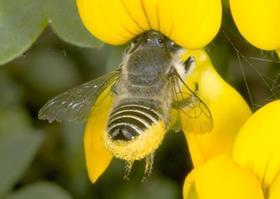
The UK government has sparked renewed debate after it announced it rejected the scientific case for a ban on neonicotinoid insecticides.
In its response to Parliament’s Environmental Audit Committee (EAC) report on pollinators and pesticides, the government rejected the peer-reviewed evidence that led the European Commission to conclude a moratorium on the use of three neonicotinoid insecticides is a proportionate and necessary step to protect bees and other insect pollinators.
Although the the government has acknowledged that it must implement the EC ban in the UK, it has refused to introduce the monitoring scheme for insect pollinators recommended by the EAC.
Chair of the EAC, Joan Walley MP, said: “I am disappointed that the government has not accepted the great weight of scientific evidence that points to the need for the ban on these pesticides in line with the precautionary principle.”
But the National Farmers Union has welcomed government’s “sensible” approach. NFU horticulture adviser Dr Chris Hartfield said: “This response is a very balanced and sensible reaction to the EAC’s report. Pollinators are essential for maintaining our biodiversity and pollinating many agricultural and horticultural crops. To ensure they are rightly protected from whatever damaging challenges they face, it is essential that our actions are led by the science. The NFU is committed to the approach of producing more while impacting less on the environment and under this approach, we are very mindful of the impacts of agriculture on pollinators.'
The NFU believes farming’s commitment to protecting the environment is already helping pollinators. Recent research by an international group of bee scientists has linked conservation work and the agri-environmental management done by farmers and growers to the slowing down of bee, hoverfly and wildflower losses.
Hartfield added: “The good news we should be celebrating is that declines in bumble bee biodiversity in Great Britain have slowed since 1990, and for other wild bees - the solitary bees that make up around 90 per cent of our bee species - biodiversity has increased significantly in recent decades.”
The Soil Association said it was disappointed with the government's position.Peter Melchett, Soil Association policy director, said:“All those who care about the future of bees will share the EAC’s disappointment that the government still refuses to accept scientific evidence that neonicotinoid insecticides need to be banned. Luckily for bees and wild pollinators, European scientists have accepted the scientific evidence and the three most damaging insecticides will be banned from the end of this year.
'In their response to the Audit Committee, the government has accepted the process for assessing risks to pollinators from pesticides needs updating. The Soil Association is urging the government to take account of new scientific evidence from the United States, which showed that bees may be consuming up to 21 different pesticides in the pollen they collect on farmland. US scientists have shown that this lethal cocktail is far more damaging to bees than individual pesticides.”
The UK government it is legally bound to implement the restrictions on pesticides with neonicotinoids when they come into force on 1 December.



